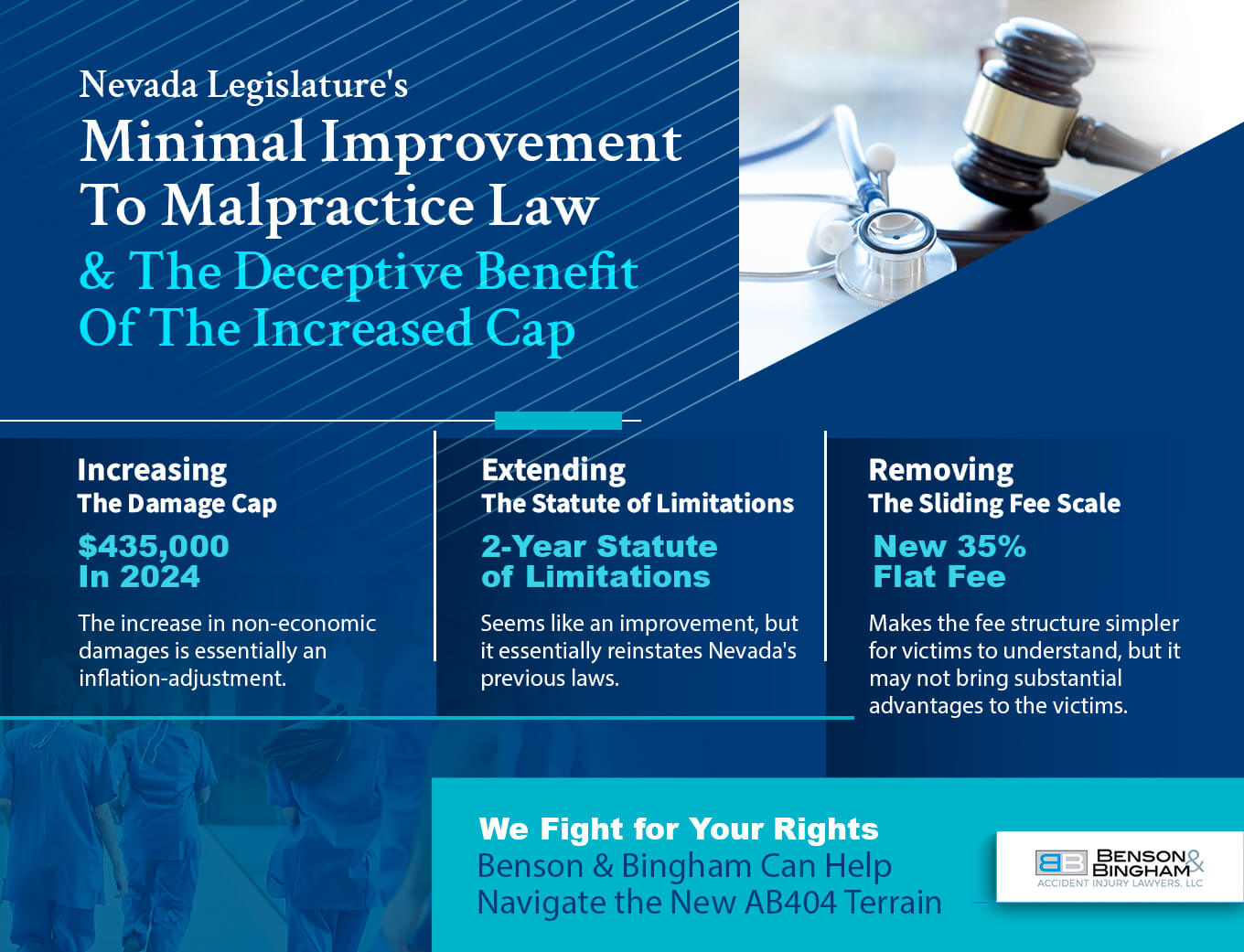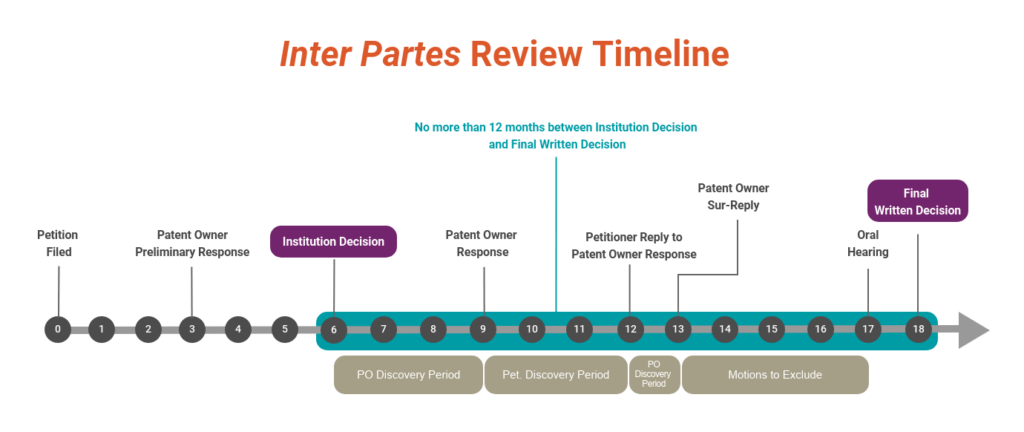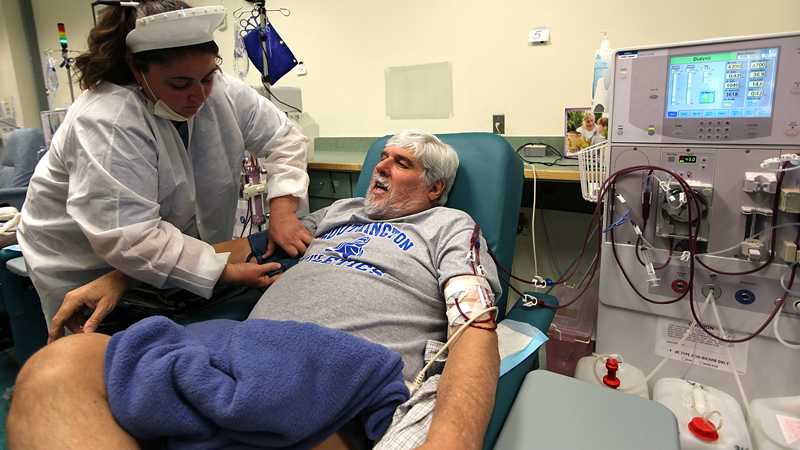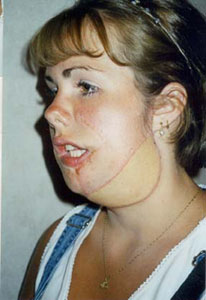Last summer, my cousin’s routine cosmetic procedure in Las Vegas turned into a nightmare of complications and legal battles. Her experience opened my eyes to the unique challenges of medical malpractice in this vibrant city. Recent data from the Nevada Division of Insurance reveals a 15% increase in medical malpractice claims in Las Vegas in 2022 compared to the previous year. This statistic isn’t just a number—it represents real people facing life-altering consequences.
Las Vegas isn’t your average city when it comes to healthcare and legal matters. The fusion of world-class medical facilities, a booming tourism industry, and Nevada’s specific laws creates a complex landscape for medical malpractice cases. Whether you’re a resident or a visitor, understanding these intricacies could be crucial if you ever find yourself dealing with a medical mishap in the Entertainment Capital of the World.
In this guide, we’ll dive deep into the unique aspects of medical malpractice in Las Vegas. From the impact of medical tourism to the role of casino healthcare facilities, we’ll explore the factors that make these cases particularly challenging. We’ll also look at how recent developments in telemedicine are reshaping the legal landscape.
The Unique Legal Landscape of Medical Malpractice in Las Vegas
Las Vegas’s healthcare infrastructure, combined with Nevada’s specific laws and the transient nature of its population, creates a complex legal landscape for medical malpractice cases. It’s a jurisdiction where understanding the nuances can make or break a case.
One key factor to consider is Nevada’s comparative negligence law. This law can significantly impact medical malpractice cases, potentially reducing damages if the patient is found partially at fault. For instance, if a patient fails to disclose crucial information about their medical history or doesn’t follow post-operative instructions, it could affect the outcome of their case.
Another unique aspect is the Nevada Hospital Patients’ Bill of Rights. This set of regulations provides additional protections that can influence malpractice claims. It outlines specific rights patients have, such as the right to be informed about their treatment options and the right to refuse treatment. Violations of these rights can strengthen a malpractice claim.
It’s worth noting that medical malpractice cases have been on the rise. According to a study published in the National Library of Medicine, there’s been a steady increase in cases over the past few years. This trend underscores the importance of understanding the legal landscape in Las Vegas.

Source: bensonbingham.com
Nevada’s Statute of Limitations and Its Impact
When it comes to medical malpractice claims in Nevada, time is of the essence. The state’s statute of limitations is notably shorter than many other states, creating a sense of urgency for potential claimants. This time constraint can significantly impact the preparation and filing of a case.
In Nevada, you generally have 3 years from the date of injury or 1 year from the date the injury was discovered to file a medical malpractice claim. This is a relatively short window, especially considering the complexity of these cases. It’s crucial to act quickly if you suspect you’ve been a victim of medical malpractice.
But wait, there’s more. Nevada also has a statute of repose that bars any action after 5 years from the date of injury, regardless of when the injury was discovered. This means that even if you don’t realize you’ve been harmed until years later, you might be out of luck if too much time has passed.
There are some exceptions to these time limits. Cases involving fraud, concealment, or the presence of foreign objects left in the body during surgery may have extended deadlines. However, these exceptions are narrowly interpreted, so it’s best not to rely on them.
The tight timeframes in Nevada make it crucial to seek legal advice as soon as you suspect malpractice. Gathering medical records, consulting experts, and building a strong case takes time. Waiting too long could mean losing your right to seek compensation altogether.
“Nevada Medical Board Suspends Las Vegas Psychiatrist’s License” (The Nevada Globe)
The Discovery Rule Exception
Nevada’s discovery rule can be a game-changer in medical malpractice cases. This exception can extend the filing deadline if the injury wasn’t immediately apparent, adding a layer of complexity to case timelines. It’s crucial to understand how this rule works and when it applies.
The discovery rule in Nevada begins the statute of limitations when the plaintiff discovers, or reasonably should have discovered, the injury and its relationship to the alleged malpractice. This means that if you had surgery and didn’t realize there was a problem until two years later, your one-year clock might start ticking from that point of discovery, not from the date of the surgery.
However, it’s not as simple as it sounds. Courts in Nevada apply an objective standard to determine when a reasonable person should have discovered the injury. This means it’s not just about when you personally realized something was wrong, but when a typical person in your situation should have noticed.
The burden of proof for applying the discovery rule typically falls on the plaintiff. This means if you’re trying to extend your filing deadline using this rule, you’ll need to provide evidence showing why you couldn’t have reasonably discovered the injury earlier.

Source: fr.com
Tolling for Minors
When it comes to medical malpractice cases involving minors in Las Vegas, special considerations apply. These can potentially extend the time frame for filing a claim, providing additional protection for young patients who may not be immediately aware of malpractice or its consequences.
In Nevada, the statute of limitations for minors in medical malpractice cases is tolled until the child reaches the age of 18. This means that the clock doesn’t start ticking until their 18th birthday. It’s a crucial protection, recognizing that children may not be able to recognize malpractice or take legal action on their own.
Parents or guardians have the option to file on behalf of a minor before they turn 18, but they’re not required to do so. This flexibility allows families to make decisions based on their specific circumstances and the child’s best interests.
However, it’s important to note that the tolling provision for minors is subject to Nevada’s statute of repose. This sets an absolute deadline of 10 years from the date of injury for filing a claim. So, if a child is injured at birth, the case must be filed by their 10th birthday, even though they’re still a minor.
| Age of Minor at Time of Injury | Statute of Limitations Expires |
|---|---|
| 0-8 years old | 10 years from date of injury |
| 9-17 years old | On 18th birthday |
| 18 years old | Standard adult timeline applies |
The Role of Medical Tourism in Las Vegas Malpractice Cases
Las Vegas isn’t just a destination for entertainment; it’s also a hub for medical tourism. This unique status introduces distinct challenges in establishing jurisdiction and liability in malpractice cases. The influx of out-of-state patients seeking various medical procedures adds layers of complexity to potential legal actions.
Medical tourism in Las Vegas often involves elective procedures, which can affect the standard of care expectations in malpractice cases. When patients travel specifically for a procedure, there might be different assumptions about risk and outcomes compared to local patients seeking routine care.
Cross-jurisdictional issues can arise when patients travel from other states or countries for medical treatment in Las Vegas. Determining which laws apply and where a case should be filed can become a complex legal puzzle. It’s not always as simple as filing where the treatment took place.
The Nevada Legislature has recognized the unique challenges posed by medical tourism. They’ve enacted specific laws addressing this phenomenon, including requirements for written treatment plans and disclosure of risks. These regulations aim to protect both patients and healthcare providers in this specialized market.

Source: reviewjournal.com
Cross-Border Complications
When patients travel to Las Vegas for medical procedures, determining the applicable law and jurisdiction can become a complex issue. These cross-border complications can significantly impact the course of a malpractice case, affecting everything from where the case is filed to which laws apply.
Choice of law issues in medical tourism cases often involve a complex analysis of where the alleged malpractice occurred and where the harm was suffered. For instance, if a patient from California has surgery in Las Vegas but complications arise after they return home, which state’s laws should apply? It’s not always a straightforward answer.
Nevada courts may apply the “most significant relationship” test to determine which state’s law should apply in cross-border malpractice cases. This test considers various factors, including where the injury occurred, where the conduct causing the injury occurred, and where the parties reside or do business.
Jurisdictional challenges can arise when defendants argue that Nevada is an inconvenient forum for out-of-state plaintiffs. They might claim that key witnesses and evidence are located in the patient’s home state, making it more appropriate to litigate there. These arguments can sometimes succeed in getting cases dismissed or transferred.
A real-world example might help illustrate these complexities. Imagine a patient from California travels to Las Vegas for cosmetic surgery. Complications arise after they return home. The case may involve both Nevada and California laws, requiring careful analysis to determine jurisdiction and applicable statutes. It’s a legal tug-of-war that can significantly impact the outcome of the case.
Standard of Care Variations
The expected standard of care may differ for elective procedures common in medical tourism, affecting the basis for malpractice claims. Understanding these variations is crucial for both patients and healthcare providers in the Las Vegas medical tourism industry.
The standard of care for elective procedures in Las Vegas may be influenced by the city’s reputation as a destination for cosmetic and experimental treatments. There might be an expectation of cutting-edge techniques or more aggressive approaches than in other jurisdictions. This can complicate malpractice cases, as determining what constitutes “reasonable” care becomes more nuanced.
Expert witnesses in medical tourism cases often need to address both local and national standards of care. They might need to explain how practices in Las Vegas compare to those in other major medical tourism destinations or the patient’s home state. This dual perspective can be crucial in establishing whether malpractice occurred.
Nevada law requires healthcare providers to obtain informed consent specifically addressing risks associated with medical tourism. This might include discussing potential complications of travel after surgery or challenges in follow-up care for out-of-state patients. Failure to adequately address these unique risks could form the basis of a malpractice claim.
Navigating the Intersection of Healthcare and Entertainment
Las Vegas’s unique blend of healthcare services and entertainment industry creates a distinctive context for medical malpractice cases. This intersection requires specialized knowledge and approach, as the lines between medical care and hospitality can sometimes blur.
The 24/7 nature of Las Vegas’s entertainment industry can impact healthcare delivery, potentially affecting standards of care and practitioner fatigue. Imagine a doctor who’s just finished a long shift at a casino medical center being called to handle an emergency. The potential for errors in this scenario is higher than in a typical hospital setting.
Nevada law includes specific provisions addressing the responsibilities of healthcare providers in entertainment venues. These regulations recognize the unique challenges of providing medical care in an environment primarily designed for leisure and entertainment. They set standards for things like response times, equipment availability, and staff training.
It’s worth noting that the stakes in these cases can be incredibly high. A Johns Hopkins University study found that more than 250,000 victims die each year because of medical malpractice. In a city like Las Vegas, where healthcare and entertainment intertwine so closely, the potential for serious incidents is a real concern.
Cosmetic Procedure Malpractice in the Entertainment Capital
The high demand for cosmetic procedures in Las Vegas introduces specific types of malpractice claims related to elective surgeries and treatments. The pressure to achieve rapid results for performers and tourists alike can sometimes lead to rushed or risky procedures.
Nevada law requires specific informed consent procedures for cosmetic surgeries, including a cooling-off period between consultation and procedure. This mandatory waiting period is designed to give patients time to fully consider the risks and benefits of their chosen procedure. However, in a city where many visitors are only in town for a short time, there might be pressure to bypass or rush through this important step.
The standard of care for cosmetic procedures in Las Vegas may be influenced by the city’s reputation for cutting-edge treatments. Patients might expect more dramatic results or newer techniques than they would in their hometown. This can create a challenging environment for practitioners, who must balance patient expectations with medical best practices.
Malpractice claims in cosmetic procedures often involve issues of promised results versus realistic outcomes. In a city known for its glitz and glamour, there might be heightened expectations for perfection. When results fall short of these expectations, even if they’re within normal medical parameters, patients might be more likely to pursue legal action.

Source: centerjd.org
Celebrity Cases and Media Influence
High-profile malpractice cases involving celebrities can significantly impact public perception and legal strategies in Las Vegas. These cases often attract media attention, potentially influencing jury pools and settlement negotiations.
Nevada courts have specific procedures for handling high-profile cases, including potential changes of venue and enhanced jury selection processes. These measures aim to ensure fair trials despite intense media scrutiny. For instance, a case involving a well-known performer might be moved to a different county to find an impartial jury.
Confidentiality agreements are common in celebrity malpractice cases, potentially limiting the precedential value of settlements. While these agreements protect the privacy of the parties involved, they can also make it harder for other patients to understand the potential outcomes of similar cases.
Media coverage of celebrity malpractice cases can influence public perception of medical procedures and standards of care. A high-profile case might lead to increased scrutiny of certain types of procedures or practitioners. This can create challenges for healthcare providers, who might face heightened patient anxiety or unrealistic expectations based on media portrayals.
“Lawsuit: Mother died after OB-GYN did not properly treat heart infection” (Las Vegas Review-Journal)
The Impact of 24/7 Healthcare Services
Las Vegas’s round-the-clock medical services, catering to tourists and shift workers, present unique challenges in establishing standard of care and practitioner fatigue. The constant demand for medical care can strain resources and potentially impact the quality of care provided.
Nevada labor laws include specific provisions for healthcare workers in 24/7 facilities, addressing issues of shift length and mandatory rest periods. These regulations aim to prevent fatigue-related errors. However, the reality of providing continuous care in a city that never sleeps can sometimes clash with these ideals.
The standard of care in 24/7 healthcare facilities may be influenced by factors such as time of day and staffing levels. A procedure performed at 3 AM might be held to a different standard than one done during regular business hours, especially if staffing or resource availability differs.
Malpract Malpractice claims involving 24/7 healthcare services often require analysis of staffing patterns and fatigue management protocols. Experts might examine shift schedules, handover procedures, and rest policies to determine if fatigue played a role in a medical error.
Shift Work and Medical Errors
The link between non-traditional work hours and increased risk of medical errors demands special attention in malpractice cases. Grasping how shift work impacts healthcare delivery is vital for both prevention and litigation of medical errors in Las Vegas.
Research indicates a higher rate of medical errors during night shifts and extended work hours, which may be relevant in establishing negligence. This data could be crucial evidence in cases where errors occurred during off-peak hours or at the end of a long shift.
Nevada regulations on healthcare worker scheduling can be pivotal evidence in malpractice cases involving fatigue-related errors. These rules might set limits on consecutive hours worked or mandate minimum rest periods between shifts. Violations of these regulations could strengthen a plaintiff’s case.
Expert testimony on the impact of shift work on cognitive function and decision-making often plays a key role in these cases. Specialists might explain how fatigue affects a healthcare provider’s ability to make sound judgments or perform complex procedures.
| Shift Type | Relative Risk of Medical Errors |
|---|---|
| Day Shift | Baseline |
| Evening | 1.2x higher risk |
| Night | 1.5x higher risk |
| Extended | 1.8x higher risk |
Emergency Care in a Tourist-Heavy Environment
The high volume of tourists receiving emergency care introduces complexities in follow-up care and long-term damage assessment. These unique circumstances can significantly impact both the occurrence and litigation of medical malpractice cases in Las Vegas.
Nevada law includes specific provisions for emergency medical care, including limitations on liability for certain emergency treatments. These rules recognize the challenging nature of providing care in high-pressure, time-sensitive situations, especially when dealing with unfamiliar patients.
The transient nature of tourists can complicate follow-up care and long-term monitoring, potentially affecting causation arguments in malpractice cases. When patients return to their home states or countries shortly after treatment, it becomes harder to track outcomes or provide necessary follow-up care.
Language barriers and unfamiliarity with local healthcare systems can impact informed consent and patient communication in tourist-heavy emergency departments. This can lead to misunderstandings about treatment plans or potential risks, which might later form the basis of a malpractice claim.
Consider this scenario: A tourist from Japan experiences a medical emergency in a Las Vegas casino. The language barrier leads to miscommunication about their medical history, resulting in improper treatment. This situation highlights the unique challenges of emergency care in Las Vegas’s tourist-centric environment.
The Role of Expert Witnesses in Las Vegas Medical Malpractice Cases
Expert witnesses play a crucial role in Las Vegas medical malpractice cases, with unique considerations due to the city’s specialized medical services and diverse patient population. The selection and testimony of these experts can often make or break a case.
Nevada law requires expert witnesses in medical malpractice cases to be qualified in the same specialty as the defendant. This requirement ensures that the expert can speak authoritatively about the standard of care in the specific field involved in the case.
The state’s medical malpractice screening panels often rely heavily on expert testimony to determine merit. These panels, which review cases before they can proceed to court, depend on expert opinions to assess whether a claim has sufficient basis to move forward.
It’s worth noting that expert testimony plays a significant role in case outcomes. According to the U.S. Bureau of Justice Statistics, about 93% of medical malpractice cases were resolved before a trial was completed. Expert opinions often drive these pre-trial resolutions.

Source: simmonsandfletcher.com
Recruiting Out-of-State Experts
The transient nature of Las Vegas’s medical community often necessitates bringing in out-of-state expert witnesses, introducing logistical and credibility challenges. This practice can significantly impact the course and outcome of malpractice cases.
Nevada courts have specific rules for qualifying out-of-state expert witnesses in medical malpractice cases. These rules ensure that experts from other jurisdictions are sufficiently familiar with Nevada’s healthcare landscape and legal requirements.
The use of out-of-state experts can introduce challenges related to familiarity with local standards of care. An expert from a major metropolitan area might have different expectations or experiences than those typical in Las Vegas, potentially affecting their testimony.
Travel costs and scheduling difficulties for out-of-state experts can impact case strategy and timelines. Attorneys must balance the need for the best possible expert with practical considerations of availability and cost.
Telehealth Experts in the Post-Pandemic Era
The increased use of telehealth services has created a new category of expert witnesses, requiring adaptation in how testimony is presented and evaluated. This shift has introduced new considerations in Las Vegas medical malpractice cases.
Nevada has specific laws governing telehealth services, which can impact the standard of care in telemedicine malpractice cases. Experts in these cases need to be well-versed in both the medical aspects of care and the technological requirements of telehealth delivery.
Expert witnesses in telehealth cases may need to address both technological and medical aspects of care. They might be called upon to explain how virtual consultations differ from in-person visits or how technical issues could have affected diagnosis or treatment.
The admissibility of remote expert testimony has evolved, with courts developing new protocols for virtual appearances. This change allows for greater flexibility in expert selection but also introduces new challenges in presenting and evaluating testimony.

Source: cahnlitigation.com
Specialty-Specific Challenges in Expert Testimony
Las Vegas’s unique medical landscape, including specialized resort doctors and concierge medicine, requires carefully selected expert witnesses who understand these niche practices. Finding experts with relevant experience in these areas can be crucial to building a strong case.
Expert witnesses in cases involving resort or concierge medicine may need to address unique standards of care and patient expectations. These specialized practices often promise a higher level of personalized care, which can affect how the standard of care is interpreted in malpractice cases.
Nevada law includes specific provisions for expert testimony in cases involving experimental treatments, which are more common in Las Vegas’s specialized medical practices. Experts in these cases need to be familiar with cutting-edge procedures and how they compare to more established treatments.
The credibility of expert witnesses can be particularly scrutinized in cases involving niche or luxury medical services. Courts and juries may be more skeptical of testimony about practices that aren’t widely available or well-understood outside of specialized settings.
The Vegas Factor in Jury Perception
Local juries may have preconceived notions about medical care in Las Vegas, necessitating careful expert witness selection and preparation to address these biases. Understanding and navigating these perceptions can be crucial to the success of a malpractice case.
Jury selection in Las Vegas medical malpractice cases often involves specific questioning about perceptions of local healthcare and the entertainment industry. Attorneys might probe potential jurors about their experiences with Las Vegas healthcare or their views on the city’s reputation for excess.
Expert witnesses may need to address common misconceptions about Las Vegas healthcare in their testimony. They might need to explain how local practices compare to national standards or dispel myths about the quality of care in a tourist-heavy environment.
The impact of local media coverage on jury perceptions can be a significant factor in high-profile malpractice cases. Experts might need to contend with jurors who have preconceived notions based on sensationalized news stories or popular depictions of Las Vegas healthcare.
Alternative Dispute Resolution in Las Vegas Medical Malpractice
Las Vegas offers unique alternative dispute resolution (ADR) options for medical malpractice cases, reflecting the city’s innovative approach to legal challenges. These options can provide faster, more cost-effective resolutions to malpractice claims.
Nevada law encourages the use of ADR in medical malpractice cases, with specific provisions for mediation and arbitration. This legislative support has led to a higher adoption rate of ADR methods in Las Vegas compared to many other jurisdictions.
The success rate of ADR in Las Vegas medical malpractice cases is higher than the national average. This trend reflects both the effectiveness of local ADR programs and the willingness of parties to engage in these alternative processes.

Source: squarespace-cdn.com
Medical Malpractice Screening Panels
Nevada’s use of screening panels in medical malpractice cases presents both opportunities and challenges for claimants in Las Vegas. These panels play a significant role in filtering out non-meritorious claims and encouraging early settlements.
Nevada law requires most medical malpractice cases to go through a screening panel before proceeding to court. This mandatory step aims to reduce the number of frivolous lawsuits and promote early resolution of valid claims.
The findings of the screening panel are admissible in subsequent litigation, potentially influencing jury decisions. A panel’s determination that a claim has merit can strengthen a plaintiff’s position, while a negative finding can be a significant hurdle to overcome.
Parties can bypass the screening panel process under certain circumstances, such as when both sides agree to waive it. This option provides flexibility for cases where the parties prefer to move directly to litigation or alternative dispute resolution.
Impact on Settlement Negotiations
The findings of screening panels can significantly influence settlement negotiations, often expediting the resolution process. Understanding how these panels operate and their potential impact is crucial for both plaintiffs and defendants in Las Vegas medical malpractice cases.
A favorable panel finding can strengthen a plaintiff’s negotiating position, often leading to quicker settlements. Defendants may be more inclined to offer fair compensation when faced with a panel decision supporting the plaintiff’s claim.
Defendants may be more inclined to settle after an unfavorable panel decision to avoid the risk of a jury trial. The panel’s findings can serve as a reality check, encouraging realistic assessments of case strengths and weaknesses.
The confidentiality of panel proceedings can impact how findings are used in subsequent negotiations or litigation. While the panel’s decision is admissible in court, the details of the proceedings are often protected, allowing for more open discussions during the panel process.
Mediation in the Shadow of the Strip
Las Vegas’s unique setting influences the mediation process, with resort facilities often serving as neutral ground for negotiations. This distinctive environment can impact the dynamics and outcomes of mediation in medical malpractice cases.
Nevada courts often encourage or mandate mediation in medical malpractice cases before trial. This push towards mediation reflects a recognition of its effectiveness in resolving complex healthcare disputes.
The use of resort facilities for mediation can create a more relaxed atmosphere, potentially facilitating settlements. The neutral, comfortable setting can help ease tensions and promote more productive negotiations.
Mediators in Las Vegas often have specialized knowledge of the local healthcare and tourism industries. This expertise allows them to navigate the unique aspects of medical malpractice cases in the city’s distinctive healthcare landscape.
Cultural Competence in Mediation
The diverse backgrounds of patients and practitioners in Las Vegas necessitate culturally competent mediators to facilitate effective resolution. This cultural awareness can be crucial in navigating complex malpractice disputes.
Mediators in Las Vegas often receive specific training in cultural competence to address the city’s diverse population. This training helps them navigate cultural differences that might impact perceptions of medical care or approaches to conflict resolution.
Language interpretation services are frequently used in mediations involving international patients. Ensuring clear communication is essential for fair and effective mediation, especially in a city with a high volume of international visitors.
Cultural factors can significantly impact perceptions of medical care and expectations for resolution. A skilled mediator must be able to bridge these cultural gaps, helping all parties understand each other’s perspectives and find common ground.
The Impact of Casino Healthcare Facilities on Malpractice Claims
Las Vegas’s unique casino-based healthcare facilities present distinct challenges in medical malpractice cases, blurring the lines between hospitality and medical care. These facilities introduce complex liability issues and unique standards of care considerations.
Nevada law includes specific provisions addressing the responsibilities of casino-based healthcare facilities. These regulations recognize the dual nature of these facilities as both medical providers and part of the hospitality industry.
The dual nature of these facilities as both medical providers and hospitality venues can complicate liability determinations. Questions may arise about whether a particular incident falls under medical malpractice or premises liability law.
Liability Issues in Casino Medical Centers
Determining liability can be complex when medical care is provided within casino premises, often involving multiple parties and jurisdictions. These cases require a nuanced understanding of both healthcare and hospitality law.
Casino medical centers may be subject to both healthcare regulations and gaming commission oversight. This dual regulatory environment can create unique compliance challenges and liability considerations.
The relationship between casino operators and healthcare providers can impact liability determinations. Questions may arise about the level of control casinos have over medical operations and whether they can be held responsible for medical errors.
Premises liability issues often intersect with medical malpractice claims in casino healthcare settings. For example, a slip and fall on the way to a casino medical center might involve elements of both premises liability and medical malpractice if improper care follows.
Intoxication and Informed Consent
The prevalence of alcohol in Las Vegas can complicate issues of informed consent in medical procedures, particularly in casino-based facilities. This unique aspect of Las Vegas healthcare requires special consideration in malpractice cases.
Nevada law addresses issues of patient intoxication in medical treatment, particularly in emergency situations. Healthcare providers must navigate the challenges of obtaining informed consent from patients who may be under the influence.
Healthcare providers in casino settings may have additional duties to assess patient capacity for informed consent. This might include protocols for determining a patient’s sobriety before proceeding with non-emergency treatments.
Documentation of patient sobriety or intoxication can be crucial evidence in malpractice cases involving consent issues. Detailed records of patient assessments and consent procedures can be key in defending against or proving malpractice claims.
Emergency Response in Gaming Environments
The unique layout and operations of casinos can affect emergency medical response times and procedures, potentially impacting malpractice claims. Understanding these environmental factors is crucial for both prevention and litigation of medical errors in casino settings.
Nevada gaming regulations include specific requirements for emergency medical response in casinos. These rules might dictate the placement of medical equipment, staffing levels, or response time expectations.
The layout and crowd dynamics of casinos can impact response times and access to patients. Navigating through a busy casino floor to reach a medical emergency presents challenges not typically seen in traditional healthcare settings.
Expert testimony on casino emergency protocols is often key in malpractice cases involving delayed treatment. Specialists might need to explain how casino-specific factors influenced the timeliness and quality of care provided.
Training Standards for Casino Medical Staff
The specialized nature of casino medical facilities may require different training standards, affecting the assessment of competence in malpractice cases. These unique requirements can influence how courts evaluate the standard of care in casino healthcare settings.
Casino medical staff may require additional certifications or training specific to the gaming environment. This might include specialized knowledge of common casino-related health issues or protocols for handling intoxicated patients.
The standard of care for casino medical facilities may differ from traditional healthcare settings. Courts might consider factors like the 24/7 nature of casino operations or the high volume of transient patients when assessing whether care met appropriate standards.
Training records and protocols for casino medical staff can be critical evidence in malpractice cases. These documents might reveal whether staff were adequately prepared for the unique challenges of providing healthcare in a casino environment.
Telemedicine and Cross-State Licensing in Las Vegas Malpractice
The rise of telemedicine, particularly post-COVID-19, introduces new complexities to medical malpractice cases in Las Vegas. This shift in healthcare delivery presents unique challenges in jurisdiction, standard of care, and liability determination.
Nevada has specific telemedicine laws that govern the practice of remote healthcare. These regulations address issues like provider licensing, patient consent, and technology requirements for virtual consultations.
Cross-state licensing compacts impact the ability of out-of-state providers to treat Nevada patients remotely. These agreements aim to facilitate telemedicine across state lines while maintaining appropriate oversight and standards of care.
Interstate Telemedicine Consultations
With Las Vegas attracting patients from across the country, telemedicine consultations across state lines present unique jurisdictional challenges in malpractice cases. These interstate interactions complicate the legal landscape, requiring careful navigation of varying state laws and regulations.
The location of the patient at the time of the telemedicine consultation can impact jurisdiction in malpractice cases. Courts might need to grapple with questions of whether the care was “provided” in Nevada or in the patient’s home state.
Interstate medical licensure compacts may affect liability and standard of care expectations in cross-state telemedicine. These agreements can influence which state’s laws apply and how standards of care are interpreted across different jurisdictions.
Federal regulations, such as HIPAA, intersect with state laws in telemedicine malpractice cases. Compliance with these federal standards becomes an additional factor in assessing the appropriateness of care provided via telemedicine.
Digital Evidence in Telemedicine Malpractice
The nature of digital interactions in telemedicine creates new forms of evidence, requiring specialized expertise to collect and interpret. This digital trail can be both a blessing and a challenge in malpractice cases.
Electronic health records and telemedicine platform logs can provide crucial evidence in malpractice cases. These digital records might offer detailed insights into the timing, duration, and content of virtual consultations.
Digital forensics may be necessary to authenticate and analyze telemedicine-related evidence. Experts might need to verify the integrity of video recordings or assess the reliability of digital communication logs.
Issues of data privacy and security can complicate the collection and use of digital evidence in telemedicine malpractice cases. Courts must balance the need for thorough investigation with patients’ rights to privacy in their digital health interactions.
Licensing and Credentialing Issues
The complex interplay of multi-state licensing for telemedicine providers can significantly impact the determination of liability and standard of care in malpractice cases. This evolving area of healthcare law presents unique challenges for legal practitioners in Las Vegas.
Nevada’s participation in interstate licensing compacts affects the practice of telemedicine across state lines. These agreements aim to streamline the process for providers to offer telemedicine services in multiple states while maintaining appropriate oversight.
Credentialing requirements for telemedicine providers may differ from traditional in-person care, impacting malpractice standards. Courts might need to consider whether virtual providers were appropriately credentialed for the specific services they offered.
The scope of practice for telemedicine providers can vary by state, complicating standard of care determinations. What’s considered within a provider’s scope in one state might be viewed differently in another, creating potential conflicts in malpractice cases.
Technology Failures and Liability
When telemedicine technology fails or malfunctions, determining liability between healthcare providers and technology companies adds a layer of complexity to malpractice claims. These cases often require a blend of medical and technological expertise to navigate effectively.
Product liability laws may intersect with medical malpractice in cases involving telemedicine technology failures. Courts might need to assess whether an error was due to provider negligence or a flaw in the technology itself.
The duty of care for healthcare providers may extend to ensuring proper functioning of telemedicine equipment. This could include responsibilities for testing connections, verifying audio/video quality, or having backup communication methods.
Causation can be particularly challenging to establish in cases involving technology failures during telemedicine consultations. Experts might need to reconstruct digital interactions to determine how technical issues impacted the quality of care provided.
Learnings Recap
– Las Vegas’s unique blend of healthcare and entertainment creates a distinctive legal landscape for medical malpractice cases.
– The city’s status as a medical tourism destination introduces complex jurisdictional and standard of care issues.
– Nevada’s specific laws, including shorter statutes of limitations and the use of screening panels, significantly impact malpractice litigation.
– Expert witnesses play a crucial role, with unique challenges in finding specialists familiar with Las Vegas’s niche medical practices.
– Alternative dispute resolution methods, including mediation in resort settings, offer innovative approaches to resolving malpractice claims.
– Casino-based healthcare facilities present unique liability and consent issues, particularly regarding intoxication and emergency response.
– The rise of telemedicine introduces new complexities in licensing, digital evidence, and technology-related liability.
Navigating medical malpractice cases in Las Vegas requires a nuanced understanding of the city’s unique healthcare landscape. From the impact of the entertainment industry to the challenges of medical tourism and telemedicine, each aspect demands specialized knowledge and approach.
If you’re facing a potential medical malpractice situation in Las Vegas, it’s crucial to seek experienced legal representation. Ultra Law specializes in navigating the complexities of Las Vegas medical malpractice cases. Our team understands the unique challenges posed by the city’s healthcare environment and is committed to fighting for your rights.
Don’t let the complexities of Las Vegas medical malpractice law intimidate you. Contact Ultra Law today for a free consultation. We’re here to help you understand your rights and pursue the justice you deserve.




